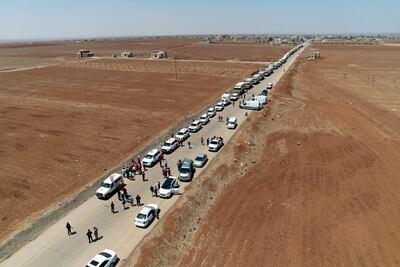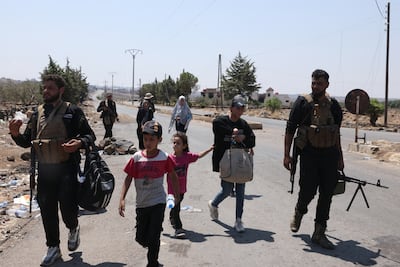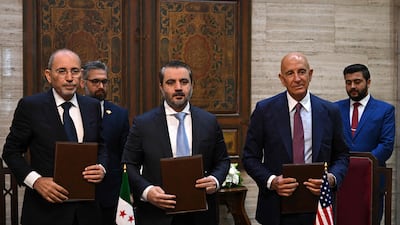Syria's Foreign Minister Asaad Al Shibani said the government will use local security forces in Sweida to stabilise the mostly Druze province, under a deal with the US to end a stand-off there between government troops and Druze militias.
Fighting between the two sides broke out in July after months of resistance from the most senior Druze spiritual leader to attempts by the government to impose security control in Sweida and appoint new local officials. Since then, the area has been cut off from the outside world.
The government's Druze forces will “protect the roads and secure the movement of people and commerce” in Sweida, Mr Al Shibani said after a meeting in Damascus on Tuesday with US special envoy Tom Barrack and Jordanian Foreign Minister Ayman Safadi.
Sweida is on the border with Jordan, which has a tiny Druze population as well as Bedouin tribes who extend into Syria.
Mr Al Shibani said the government's commitment is part of a deal agreed upon with Jordan and the US to “return normal life to Sweida”, without giving a timeline.

The text of the agreement signed by Mr Al Shibani, Mr Barrack and Mr Safadi on Tuesday was not immediately available. There was no immediate reaction from the Druze leadership in Sweida, where calls for secession from Syria have been growing louder.
Syria's Foreign Ministry also said it would work with the US to "reach security understandings with Israel concerning southern Syria that address the legitimate security concerns of both Syria and Israel".
The Interior Ministry announced on Monday a “new structure for internal security forces in Sweida”. The details were not revealed, but Suleiman Abdulbaqi, a pro-government Druze militia leader in Sweida, said that he had been appointed as an officer in the force.
The government said it sent troops to Sweida in response to clashes in July between the Druze and Sunni inhabitants of Bedouin origin. Israeli air strikes halted their advance, but Sweida remains surrounded by security forces and allied militias. The thrust of the government offensive has given way to low-intensity warfare.
Hundreds of civilians, mostly Druze, were killed in the fighting. The United Nations says there is a humanitarian crisis in the area because of shortages of food, medicine, fuel and electricity. More than 161,000 people have been displaced as a result of the conflict, most of them from the Druze population, the UN said last month.
The US has been pushing for a prisoner exchange and other measures to resolve the situation before President Ahmad Al Shara makes his first appearance at the UN General Assembly in New York next week, western and Syrian sources said.

Mr Al Shara took office shortly after rebel forces, comprised mainly of his Hayat Tahrir Al Sham (HTS) group – a former affiliate of Al Qaeda – toppled former president Bashar Al Assad in December. The situation in Sweida has hindered Washington's efforts to stabilise Syria as the new government struggles to bring all armed groups under its control following nearly 14 years of civil war.
The sources said the US plan called for an easing of a government siege of Sweida and the opening of the main roads to Damascus and neighbouring Jordan, and the entry of police in the area, without disarming Druze paramilitary forces. An exchange of dozens of prisoners and abductees is being worked out. Most of the Druze militias in Sweida were recently amalgamated under a so-called National Guard, loyal to Sheikh Hikmat Al Hijri, Syria's most senior Druze spiritual leader.
A diplomat in Amman said the US aim is to return Sweida to a similar status to what prevailed in the past two years under Mr Al Assad, when the Druze rose up against him but his government retained a security and administrative presence in the area.
“The situation, of course, is much graver now,” the diplomat said. Mr Al Shara, he said, is “co-operating more on the Sweida file” to lessen criticism of his administration ahead of his address to the UN General Assembly on September 28.
Mr Al Shara is expected to meet US officials in New York, as well as members of Syria's minority communities in the diaspora, a Syrian source said. The US started normalising ties with Damascus in May, although many of its sanctions on Syria, imposed during the regime of Mr Al Assad and his late father, remain in place.
In a gesture aimed at demonstrating state neutrality, the Interior Ministry announced on Tuesday that a special commission it had formed to investigate violations in Sweida would work “with the highest transparency”.



